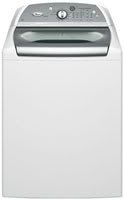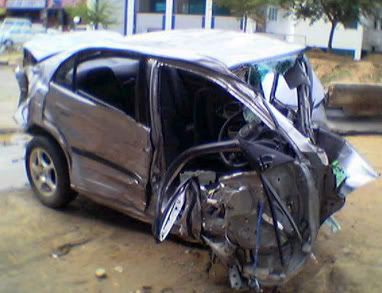High-Efficiency Woes
 I just put a load of towels and a cap-full of outrageously expensive high efficiency detergent into our new Whirlpool Cabrio washing machine like the one on the right. It's a top-loader, but it behaves like a front-loader: Water efficient, power efficient ... and so lousy that my wife won't even use it.
I just put a load of towels and a cap-full of outrageously expensive high efficiency detergent into our new Whirlpool Cabrio washing machine like the one on the right. It's a top-loader, but it behaves like a front-loader: Water efficient, power efficient ... and so lousy that my wife won't even use it.Fortunately, we kept our old workhorse set, which is now plumbed in the garage, and Incredible Wife does her laundry on our 10 year old, $250 washer instead of our new $900 unit.
I bring this all up simply because our Whirlpool Cabrio is just another example of Big Brother and Big Green teaming up to make our lives of lower quality than they were before.
The promise of these new units was that new technology would allow us to have clothes just as clean -- cleaner even -- but with much greater efficiency. Similar promises have been made for cars, light bulbs, water heaters and all sorts of comfort products, with similar results.
And it's not just me who thinks so; even the NY Times science writer John Tierney has opined on the matter:
In the battle against global warming, there is no more beloved phrase in Washington than “energy efficiency.” Mandating energy-efficient appliances costs nothing in the budget and sounds painless to voters. Who could be in favor of energy inefficiency? Congress is working on legislation now to tighten standards further — and touting all the money that consumers will save.
But if these efficient appliances are such a great deal, why do people have to be forced to buy them? The usual justification is that consumers are too shortsighted to factor in the energy savings — and you can support that with theoretical arguments from behavioral economists. People can indeed make dumb short-term decisions about long-term investments.
But when it comes to picking washing machines, it looks as if consumers are less shortsighted than the energy experts in Washington. Thanks to new federal standards, washing machines are using less energy — but as a result they cost more and clean less, as Consumer Reports concludes in its new issue:
Not so long ago, you could count on most washers to get your clothes very clean. Not anymore. Our latest tests found huge performance differences among machines. Some left our stain-soaked swatches nearly as dirty as they were before washing. For best results, you’ll have to spend $900 or more.
Which is precisely what Sam Kazman of the Competitive Enterprise Institute predicted six years ago when the Bush administration enacted the new efficiency standards with promises that new technology would clean clothes better and save money. Mr. Kazman forecast dirtier clothes and pointed out the dubious assumptions in the cost calculations, but he was no match for the coalition of environmentalists and manufacturers eager to mandate expensive new machines.
Mr. Kazman and CEI are now urging consumers to register their displeasure by sending their underwear to the Department of Energy. But it would take a lot of underwear to prevail against the forces on Capitol Hill currently working to impose still higher energy-efficiency standards on washing machines and other appliances — and on the biggest target of all, the automobile. (a belated hat-tip to fellow Watcher Soccer Dad for the clip.)
Look for more of this sort of stuff in the future. It will be hard to find a toilet that can "down brown" in one flush, or more importantly, a car that can withstand a serious impact without causing severe injuries or death to its occupants. That's right: Dying for energy efficiency.
 The same motivation that drives forced front-load washers is driving Congressional demands for tighter CAFE standards that would put decisions about fuel economy into the hands of Congress instead of the hands of consumers. The only way the car industry will be able to meet these standards is smaller, lighter cars ... cars that kill, according to the Heritage Foundation:
The same motivation that drives forced front-load washers is driving Congressional demands for tighter CAFE standards that would put decisions about fuel economy into the hands of Congress instead of the hands of consumers. The only way the car industry will be able to meet these standards is smaller, lighter cars ... cars that kill, according to the Heritage Foundation:
In any case, to meet higher CAFE standards American manufacturers will be forced to produce more smaller, lighter and therefore less safe cars. As it is, the current CAFE standards result in as many as 3,900 additional highway deaths per model-year fleet. The higher CAFE standards sought by the Bryan bill would force Americans truly to pay in blood, increasing the number of highway deaths attributable to CAFE by as much as 8,600 per model-year fleet.My big German V8 (which gets 18.9 miles per gallon) surrounds me in a cocoon of 3,737 pounds of security, as opposed to 2,290 pounds for a Toyota Yaris (which gets about double my mileage). Weight, any physicist will tell you, translates to safety in cars. (Not that small cars can't be engineered well -- see this video of a Smart Car hitting a concrete barrier head-on at 70 miles an hour. It appears the occupants, had their been any, would have survived. But I doubt their legs would have.)
There is an alternative to all this, of course. Let the washer-makers with their high efficiency units compete on a level playing field without government programs requiring greater efficiency. Let gas prices, personal economies and personal preferences drive automobile purchases. Don't put false incentives or penalties on our purchases of light bulbs or refrigerators.
The market will move towards efficiency, I'm sure, and let's be honest here: If we're really all that concerned about energy efficiency, then why isn't government de-incentivizing the purchase of powerful computers and high-def flat screen TVs? We don't hear hollering for that, do we?
Why aren't we? Because the internal combustion engine is the spiritual enemy of the Greens because it is powerful, industrial and beloved. They will attack it with passion and without ceasing. And because if you take away Al Gore's three big monitors and Joe Six Pack's big screen TV, there are political consequences.
And, of course, because demanding we put up with stains on our laundry primarily angers a bunch of housewives (sorry, but it's true). Our oh-so-brave politicians therefore aren't afraid to mandate what goes on in the laundry room.
And if you think for a minute that the Greens will have any sympathy with any point I've raised here, think again. Just ask Kim, who left this comment on Tierney's article about the foolishness of high-efficiency washers:
Take a little more responsibility for your words and learn about the scientific data behind environmentalists who are trying to preserve and protect our natural resources for generations to come. Perhaps, by taking [off] the money bag blinders before your eyes, you’d see that there are more important things in this life and in this world than “dirty underwear” versus saving an entire planet (which would take much more than money to duplicate.)Ah, the compassion (and close-up stink) of the Left!
Labels: Climate change, Environmentalism, Free markets, Global warming




<< Home